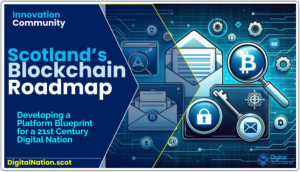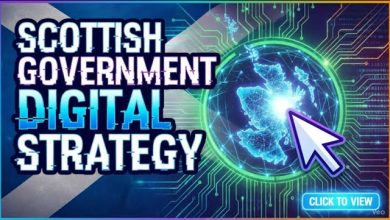Scotland’s Digital Destiny: Blockchain, Independence, and the Birth of a Virtual Nation
A Yes vote triggers 'Protocol Alba', a constitutional smart contract that forks the Scottish state into a dual-layer sovereignty: physical territory plus digital jurisdiction.
 Imagine a referendum where every ballot is immutable, every identity is cryptographically proven, and every vote is counted in real time, without a single polling station, postal delay, or contested tally.
Imagine a referendum where every ballot is immutable, every identity is cryptographically proven, and every vote is counted in real time, without a single polling station, postal delay, or contested tally.
Now imagine the same infrastructure birthing an entire nation: a sovereign digital Scotland layered atop the physical one, where citizenship, taxation, law, and public services live on a blockchain.
This is not science fiction. It is the logical endpoint of Scotland’s centuries-old quest for self-determination, accelerated by the most disruptive governance technology since the printing press.
Referendum 2.0
The gateway is a national blockchain referendum, Referendum 2.0. Scotland’s existing digital infrastructure, including mygov.scot, NHS Scotland’s patient records, and the Scottish Qualifications Authority, already handles millions of verified identities.
By layering on a permissioned blockchain, a hybrid of Hyperledger Fabric for enterprise-grade privacy and Ethereum-compatible smart contracts for transparency, the mechanics fall into place. Every eligible voter, aged 16 and over on the electoral roll, receives a self-sovereign identity wallet via the Scottish Government’s digital ID app.
Biometric enrolment with face and fingerprint ties the wallet to a soul-bound token that is non-transferable and revocable only by death or emigration. A single smart contract deploys the yes/no question: “Should Scotland be an independent country?” Voters sign their choice with their private key, and the transaction is zero-knowledge: the vote is provably cast, but the choice remains encrypted until tabulation.
A consortium of nodes, run by Holyrood, the Electoral Commission, universities such as Edinburgh, Glasgow, and St Andrews, and international observers like Estonia’s e-governance team, validates each block. Quantum-resistant signatures such as Dilithium or Falcon future-proof the chain. At 22:00 on polling day, the smart contract auto-tallies.
The ledger is public, and anyone can audit it. Turnout, regional breakdowns, and the final margin are mathematically undeniable. The cost is around £15 million, compared with £120 million for the 2014 paper referendum, and the timeline is 18 months from green light to result. Brute-forcing 10 million votes would require more energy than Scotland’s annual grid output.
The world’s first blockchain plebiscite would not just decide independence; it would prove it. There would be no Westminster server farms to hack and no postal vote scandals, just code and cryptography.
Protocol Alba
A “Yes” vote triggers Protocol Alba, a constitutional smart contract that forks the Scottish state into a dual-layer sovereignty: physical territory plus digital jurisdiction. The blockchain becomes the single source of truth for every public function.
Every Scot, resident or expatriate, claims a soul-bound NFT representing citizenship through Alba ID. Diaspora Scots, 1.5 million in England and 1 million overseas, register via consular self-sovereign identity kiosks. Citizenship grants voting rights in the Digital Parliament, and dynamic residency means that even someone living in Tokyo but paying Scottish taxes has obligations and entitlements routed seamlessly through their Alba ID.
The treasury issues ScotCoin, a central bank digital currency stablecoin pegged one-to-one to a basket of sterling, euros, and North Sea carbon credits.
Tax payments, universal basic income pilots, and oil fund dividends flow on-chain. Income tax smart contracts auto-deduct from payroll DeFi pools, and value-added tax on purchases is settled at checkout via wallet connect. Legislation operates through liquid democracy, where citizens delegate votes to members of Parliament or vote directly on bills via quadratic voting.
A proposal to nationalize wind farms is posted, debated for 72 hours in virtual reality chambers, and decided by on-chain referendum. The Scottish Constitution is a version-controlled smart contract, with amendments requiring 60 percent turnout and 60 percent approval, etched forever.
ScotCoin
Public services transform accordingly. Patient records in NHS 2.0 become verifiable credentials, allowing a general practitioner in Glasgow to share data with a specialist in Singapore with consent granted via wallet signature.
The land registry tokenizes every croft, tenement, and oil rig, enabling a flat in Edinburgh to be bought with ScotCoin and settled in 90 seconds. Micro-credentials, such as an Higher National Certificate in offshore wind maintenance, are issued as non-fungible tokens and universally recognized.
Building Digital Scotland – The World’s First Metanation
By 2030, Digital Scotland is a hybrid nation-state with 5.5 million physical citizens and 2.8 million digital ones, a gross domestic product of £220 billion on-chain and £180 billion off-chain, and observer status at the United Nations as the first metanation.
Other regions follow: Catalonia launches CatChain, Quebec forks the code, and even Texas experiments with LoneStar Ledger. The nation-state, once defined by borders, becomes modular, a stack of protocols anyone can plug into.
Risks are addressed head-on. The digital divide is bridged with subsidized Starlink and self-sovereign identity kiosks in every library, with a Gaelic interface mandatory. Attacks on 51 percent of nodes are mitigated by consortium nodes and geographic distribution, including mirrors in Orkney, Shetland, and Frankfurt. The quantum threat is countered with a post-quantum migration baked into Protocol Alba version 2.0, scheduled for 2032.
Scotland’s 2014 referendum lost by 10 percent. In 2026, the blockchain margin is 0.0003 percent and undisputed. The Saltire flies in Edinburgh and in every wallet worldwide. The nation that invented the Bank of Scotland now reinvents the nation itself. This is not the end of history. It is the beginning of programmable sovereignty.



